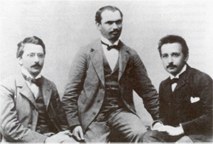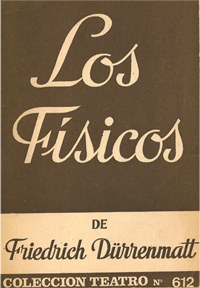Literature
Texts by Dr. Antonio Moreno González
One of the tasks that they young Habicht, Solovine and Einstein set themselves at their "Olympia Academy" in Berne was to read and make literary commentaries. Their favourite readings were the classics, including Sophocles, Racine and Cervantes. Writing in 1952, Einstein says of classical literature:
"Somebody who only reads newspapers and at best books of contemporary authors looks to me like an extremely near-sighted person who scorns eyeglasses. He is completely dependent on the prejudices and fashions of his times, since he never gets to see or hear anything else. And what a person thinks on his own without being stimulated by the thoughts and experiences of other people is even in the best case rather paltry and monotonous.
There are only a few enlightened people with a lucid mind and style and with good taste within a century. What has been preserved of their work belongs among the most precious possessions of mankind. We owe it to a few writers of antiquity (Plato, Aristotle, etc.) that the people in the Middle Ages could slowly extricate themselves from the superstitions and ignorance that had darkened life for more than half a millennium.
Nothing is more needed to overcome the modernist's snobbishness."
Amongst contemporary literature, Einstein was attracted by the worldview of H. G. Wells and Bernard Shaw. At a talk on The Jewish Community given at the Savoy Hotel in London in 1934, which was attended by the two writers, Einstein turned to Shaw, whom he called a "doctor of the soul" on account of the moral principles contained in his works and said:
"You, Mr. Shaw, have succeeded in winning the affection and joyous admiration of the world while pursuing a path that has led many others to a martyr's crown. You have not merely preached moral sermons to your fellows; you have actually mocked at things which many of them held sacred. You have done what only the born artist can do. [...] [Thus you] have relieved life of something of its earth-bound heaviness."
Einstein himself became a literary motif for some writers. During his time as a lecturer in Prague he met the writer Max Brod, the friend, biographer and publisher of Franz Kafka, who acknowledged that the character of Kepler in his novel Tycho Brahes Weg zu Gott (1916, The Redemption of Tycho Brahe) , was inspired by Albert Einstein. Other authors also used him as a model, including the Spaniards Juan Ramón Jiménez, Ramiro de Maeztu, Pedro Salinas, Ortega y Gasset, Jorge Guillén, Ramón Pérez de Ayala and Salvador de Madariaga
In Friedrich Dürrenmatt's black comedy Die Physike (1962, The Physicists) , Einstein and Newton are the names used by patients in a lunatic asylum in which the hero of the play, the nuclear physicist Möbius (discoverer of the formula for creating the atom bomb) takes refuge.
Just as Einstein himself was a select reader and a literary motif, his work, together with that of Planck and those who brought about the relativist and quantum revolutions of the twentieth century, is considered by some scholars of cultural movements to have wielded a considerable influence over literature and the visual arts, fields which during the first third of the twentieth century opened up to new movements which would be as revolutionary as those that had occurred in physics. Authors such as William Carlos Williams, Archibald MacLeish, Virginia Woolf, Vladimir Nabokov, Lawrence Durrell, William Faulkner and James Joyce, to name only the most outstanding of Einstein's contemporaries, found a language inspired by the new scientific concepts of the world. Alan J. Friedman and Carol C. Donley examine these influences and particularly the impact on literature, in Einstein as Myth and Muse (1985). Gerald Holton in Einstein, History and Other Passions (1995) advises greater caution in assigning such influence: "The tempting task of finding the detailed culmination of hidden causal loops that relate capital works and the spirit of the times remains for future researchers"

With Conrad Habicht (1884 - 1948) and Maurice Solovine (1875 - 1958), the "Academia Olympia". During his time in Bern

